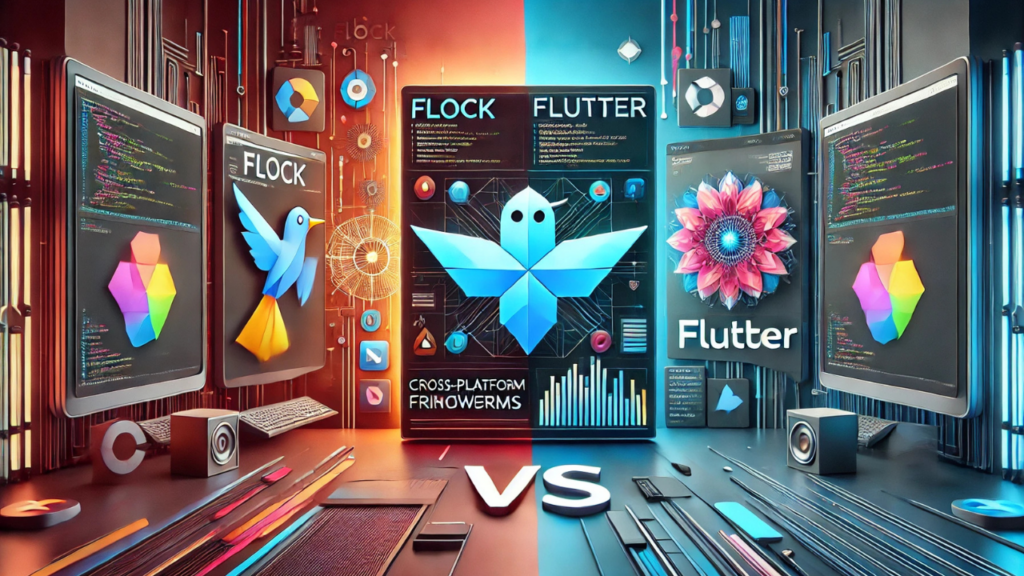Introduction
Welcome to StartupHakk! Today, we’re diving into an exciting battle in cross-platform development: Flock vs. Flutter. Flutter has long dominated the scene. But now, Flock, a promising fork, is making waves. The big question: can Flock dethrone Flutter, or is Flutter’s reign secure? Let’s compare their strengths, weaknesses, and why Flutter might still hold the crown—for now.
Point 1: Background
Flutter has been the go-to tool for cross-platform development. It lets developers create apps for iOS, Android, web, and desktop from a single codebase. Backed by Google, it offers stability and a vast ecosystem.
Flock emerged recently as a fork of Flutter. Developers created Flock to address some of Flutter’s limitations. Their goal? A more agile framework with fewer restrictions. While Flock retains Flutter’s core functionality, it promises enhancements that could attract frustrated developers.
Point 2: What Sets Flock Apart?
Flock’s main strength lies in faster development. It aims to improve compilation times and streamline workflows. Developers often face platform-specific performance issues with Flutter, especially for web and desktop. Flock claims to solve these pain points.
However, it’s not all smooth sailing. While Flock offers exciting possibilities, new features can come with growing pains. For developers who crave experimentation, Flock might be worth a shot. But those seeking a tried-and-tested tool might hesitate.
Point 3: Stability and Long-Term Viability
Flutter’s biggest advantage is stability. Supported by Google, it receives regular updates and improvements. This backing ensures long-term viability, which is crucial for production-level apps.
Companies rely on tools that stand the test of time. Flutter’s proven track record makes it a safer choice for projects with high stakes. Flock, while promising, lacks this level of reliability. Its future depends on how well its community grows and maintains momentum.
Point 4: Flock’s Experimental Edge
Flock shines in its ability to innovate. As a fork, it can explore features and updates without corporate red tape. This freedom allows faster iteration and cutting-edge enhancements.
However, experimentation comes with risks. Flock’s rapid changes might lack the stability needed for large-scale projects. For adventurous developers, it’s an exciting playground. But for those prioritizing reliability, Flutter remains the safer bet.
Point 5: Community Support
Community support is essential for developers. Flutter’s long-standing dominance has built a massive network of contributors. This includes forums, plugins, and open-source projects. If you encounter an issue, solutions are often a quick search away.
Flock’s community is growing but still small. Developers might struggle to find resources or answers. While Flock’s support network may expand over time, Flutter’s robust community remains unmatched for now.
Point 6: Plugin Ecosystem and Compatibility
Flutter boasts a mature ecosystem of plugins and libraries. Developers can extend functionality with minimal effort. This ecosystem saves time and ensures seamless integration.
Flock’s plugin support is still catching up. While it’s compatible with some Flutter plugins, gaps exist. These gaps can slow development and increase complexity. For developers needing immediate solutions, Flutter is the clear winner.
Point 7: Documentation and Learning Resources
Flutter offers comprehensive documentation. Detailed guides, tutorials, and learning resources make it easy for beginners to get started. Teams can onboard quickly and minimize trial-and-error.
Flock, being newer, lacks extensive documentation. Developers may face a steeper learning curve. This gap can deter teams that value efficiency and straightforward onboarding. For accessibility, Flutter takes the lead.
Point 8: Performance Across Platforms
Flock promises improved performance for web and desktop. Its optimizations aim to address Flutter’s known limitations. However, these claims are theoretical for now. Without production apps showcasing these improvements, they remain unproven.
Flutter’s performance is reliable across platforms. Developers know what to expect, making it a safer choice for businesses. Until Flock proves its claims, Flutter retains the advantage in performance.
Point 9: Updates and Future Support
Google ensures regular updates for Flutter. These updates bring new features, bug fixes, and stability improvements. This structured release cycle offers predictability for long-term projects.
Flock’s updates depend on its community. While this allows faster innovation, it risks irregular updates. Projects requiring consistent timelines might struggle with Flock’s unpredictability. For structured support, Flutter is the better option.
Point 10: Developer Recruitment and Team Readiness
Flutter’s popularity means a larger pool of skilled developers. Companies can recruit talent easily and quickly assemble teams. This advantage reduces onboarding time and ensures expertise.

Flock’s newer status limits the availability of experienced developers. Recruiting for Flock expertise may prove challenging. For businesses building teams, Flutter is the practical choice.
Point 11: Innovation Speed vs. Stability
Flock’s smaller community allows for faster innovation. Updates and features can roll out quickly. However, this speed comes with potential stability issues. Rapid changes might introduce bugs or inconsistencies.
Flutter’s slower pace ensures thorough testing and reliability. While innovation may take time, the stability tradeoff benefits production-level apps. Developers must weigh the need for speed against the risk of instability.
Point 12: The Future of Flock
Flock’s future is uncertain. It has potential but lacks a proven track record. Adoption will depend on its ability to grow a stable community and demonstrate real-world success.
Flutter, with years of dominance, remains the safer choice. Its established history provides confidence for long-term projects. While Flock intrigues, Flutter’s reliability continues to shine.
Conclusion
The Flock vs. Flutter debate highlights exciting possibilities for cross-platform development. Flutter offers stability, a vast ecosystem, and proven performance. Flock introduces innovation and faster iteration but comes with risks.
For production-level apps, Flutter is the reliable choice. For experimental projects, Flock offers potential. Both have unique strengths, catering to different developer needs. At StartupHakk, we’ll keep a close eye on Flock’s growth while relying on Flutter’s consistency for now.
Share your thoughts in the comments! Don’t forget to like, subscribe, and visit StartupHakk for more insights and services. Let us help your company’s systems run smoother than ever!




